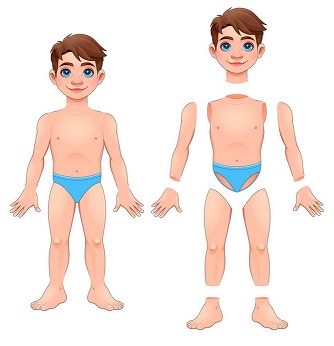I was having trouble sleeping last night because my arm kept falling asleep; I was trying to find a position where the tingling in my arm wasn’t bothering my brain, and I heard the Lord say to me “That’s my point, listen to it.“
I then heard Him tell me: In order to truly be one with a people you are different from, you have to bond with them, to be “both” with them (yes, it’s strange, but that was the Lord’s phrase I heard).
As I pondered this phrase, I realized that it’s not enough to simply be around those who are “other,” or to understand them; our very essence must be mutually changed into something different than we were. They have to become an extension of us, and vice versa – so that when something happens to them, we feel it with our very own nervous system – so we don’t just know about it but we experience it too.
To illustrate what I was sensing, I found the attached illustration online. In church we talk a lot about the parts of the body, as in 1 Cor 12:12-27, but the result (between individual churches and between different people groups) often looks like the boy on the right. Things are generally in their proper place, but they’re not truly connected and so the body isn’t functional and any given body part cannot sense injury to or the needs of a different part. Nor can nourishment flow from one part to another.

If we want to begin to benefit from each other, as churches or as different people groups, it’s going to take a fundamental change. Connectivity at the level of periodic fellowship picnics between churches, or meetings between pastors, or friendly dialog between congregants, won’t be sufficient. It will require deep inter-connectivity. There will have to be people at the edges of each group that bridge those gaps, that truly exist in both groups – just as the wrist is part of the arm AND part of the hand. At each joint, each point of connection, there must exist multiple people that span both parts. The more crossover, the stronger the bonds will be, and the better able both groups will be to meet each other’s needs.
This process may require some loosening of our concept of group identity. Individualism or loyalty will need to relax. People will need to be released to exist in both groups simultaneously – without any sense of shame or prejudice against them. At the church level, it might look like a person being on praise teams at two different churches, or leading small groups for more than one church, or simply attending multiple churches each month, or tithing in different locations from week to week.
In short, we’ll need to begin thinking like a city church, not like members of a single organization that meets in a particular building. It’s going to require reframing the entire traditional American concept of what it means to be a member of a church.
12 For just as the body is one and yet has many parts, and all the parts of the body, though they are many, are one body, so also is Christ. 13 For by one Spirit we were all baptized into one body, whether Jews or Greeks, whether slaves or free, and we were all made to drink of one Spirit.
14 For the body is not one part, but many. 15 If the foot says, “Because I am not a hand, I am not a part of the body,” it is not for this reason any less a part of the body. 16 And if the ear says, “Because I am not an eye, I am not a part of the body,” it is not for this reason any less a part of the body. 17 If the whole body were an eye, where would the hearing be? If the whole body were hearing, where would the sense of smell be? 18 But now God has arranged the parts, each one of them in the body, just as He desired. 19 If they were all one part, where would the body be? 20 But now there are many parts, but one body. 21 And the eye cannot say to the hand, “I have no need of you”; or again, the head to the feet, “I have no need of you.” 22 On the contrary, it is much truer that the parts of the body which seem to be weaker are necessary; 23 and those parts of the body which we consider less honorable, on these we bestow greater honor, and our less presentable parts become much more presentable, 24 whereas our more presentable parts have no need of it. But God has so composed the body, giving more abundant honor to that part which lacked, 25 so that there may be no division in the body, but that the parts may have the same care for one another. 26 And if one part of the body suffers, all the parts suffer with it; if a part is [h]honored, all the parts rejoice with it.
27 Now you are Christ’s body, and individually parts of it.
– 1 Cor 12:12-27 (NASB)
